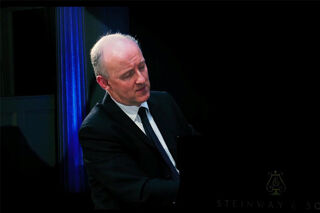James Lisney (piano)
Recital Hall, Royal Birmingham Conservatoire
200 Jennens Road, B4 7XR
£20
£10 under 18, full time students
Wheelchair users are entitled to a complimentary companion seat.
You can book a free companion ticket by selecting the seat next to yours on the seating plan.
Or, for unreserved seating plans, add a second ticket to your basket.
If you wish to discuss your accessibility needs with a member of our team, please call 0121 331 5909.
Assistance dogs are welcome at Royal Birmingham Conservatoire venues. If you wish to bring an assistance dog, please let the Events Office know by calling 0121 331 5909.

James Lisney: a musical offering
Beethoven: The final three sonatas
Preludes by Chopin, Shostakovich and Bach
Chopin Prelude, Op.45
Beethoven Sonata in E, Op.109
Shostakovich Two Preludes from Op.34
Beethoven Sonata in A flat, Op.110
JS Bach Jesu, Joy of Man’s Desiring, BWV 147 (arranged Myra Hess)
Ricercar a 3 from The Musical Offering BWV 1079
Beethoven Sonata in C minor, Op.111
Johann Sebastian Bach travelled to Potsdam in 1747 to meet King Frederick the Great. During his visit, he improvised a three-voice fugue on a theme of the King’s devising, later developing the music into the Musical Offering. Given that Bach extemporised upon the newly developed Silbermann fortepiano, the Ricercar a 3 may be regarded as the first significant work for the piano.
James Lisney’s musical offerings centre upon Beethoven’s three final sonatas, one of music’s great spiritual journeys, written when the composer was turning fifty years old and occupied with the Missa Solemnis. This transcendent, dramatic, lyrical, and ultimately communicative music is prefaced by complementary preludes by Bach, Chopin and Shostakovich.
Myra Hess was a peerless interpreter of Beethoven’s final sonatas and her transcription of Bach’s chorale prelude Jesu bleibet meinen Freude (from the Advent cantata Herz und Mund and Tat und Leben) is the perfect way to mark the sixtieth anniversary of her death (November 1965).
“Lisney…made of these sonatas a phoenix, boundlessly expressing a glorious rebirth of Beethoven’s creativity, re-animating the very phrases of his musical processes in all their enchanting, mercurial, forceful, kaleidoscopic variety – brusque and blunt, longing and tender, ineffable and sublime. One felt that all emotions human-beings had ever felt were incomparably here – and, further, some that had been felt only by this extraordinary man and, maybe, just a few others. Lisney gave us a journey of the soul.” The Classical Source
“This is someone who can really give the mechanical box of wires and wood a singing soul.” The Telegraph
Running time approx. one hour and 45 minutes